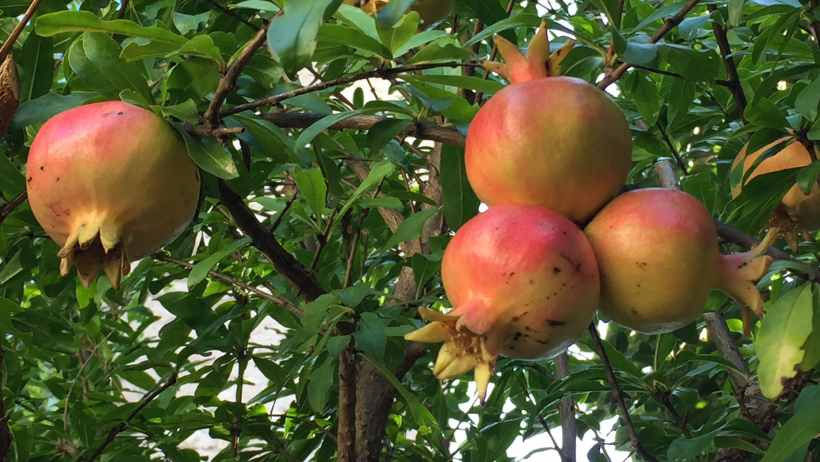
Protective plant compounds, including ellagitannins, anthocyanins, and organic acids, are abundant in pomegranates. It has been discovered that these compounds exhibit antioxidant and anti-inflammatory characteristics, both of which are essential for cellular protection against injury.
Consumption of pomegranate juice has been shown to decrease inflammatory markers in the body, suggesting that it may aid in the prevention of chronic diseases. Moreover, research has demonstrated that pomegranate juice can aid in recuperation following physical activity and improve athletic performance.
In addition, frequent ingestion of pomegranate-based products may contribute to cardiovascular well-being through the reduction of lipid levels and blood pressure. Owing to their substantial antioxidant content, pomegranates potentially exhibit beneficial impacts on memory and cognitive health.
The edible seeds, known as pomegranate arils, possess not only gustatory qualities but also supply vital nutrients and minerals, including folate and vitamin C. Nonetheless, it is advisable for individuals with diabetes or allergies to exercise prudence when consuming pomegranate products. Due to their multifunctionality, pomegranate arils and juice provide nutritional benefits and enhanced flavor to a wide range of dishes.
Compounds found in protective plants of pomegranates
Pomegranates are renowned for their distinctive flavor and vivid red hue, but they also contain an abundance of health benefits. This is primarily due to the presence of organic acids, ellagitannins, and anthocyanins, among other protective plant compounds. The potential health-promoting properties of these compounds have been the subject of extensive research, which has contributed to pomegranates’ widespread popularity among individuals who wish to enhance their general well-being.
Ellagitannins (ELA)
Pungentannins, a class of polyphenols, are notably prevalent in pomegranates. Pomegranate juice’s intense red hue is attributed to their contribution to the fruit’s astringent flavor.
Description and Definition
Complex molecules known as ellagagitannins are generated through the chemical bonding of gallic acid and ellagic acid. They are predominantly present in the pomegranate epidermis, rind, and seeds. As well-known for their potential health benefits, including their anti-inflammatory and antioxidant properties, are these compounds.
Health Advantages
A diverse array of health benefits has been attributed to the ingestion of ellagitannins. Their antioxidant properties, which enable them to counteract detrimental free radicals within the body, are a significant advantage. Ellagitannins protect cells against oxidative damage, which has been associated with a range of chronic diseases including cancer, cardiovascular disease, and neurodegenerative disorders.
Antioxidant Characteristics
The unique molecular structure of ellagitannins renders them exceptionally efficient at removing free radicals. They possess the capability of providing hydrogen atom donations, thus preventing the formation of free radicals in a chain reaction. This antioxidant activity promotes overall health by preventing cellular injury.
Property Anti-Inflammatory Actions
Ellagannins demonstrate anti-inflammatory properties, alongside their antioxidant and anti-inflammatory effects. Chronic inflammation contributes to the development of cardiovascular disease, malignancy, and numerous other conditions. It has been demonstrated that ellagitannins modulate immune responses and inhibit pro-inflammatory markers, thereby reducing inflammation and promoting health.
The Prevention of Cancer
Ellagitannins have garnered considerable interest due to their potential utility in the prevention of cancer. Anticancer properties have been attributed to these compounds, as demonstrated by research. They accomplish this by impeding the proliferation and development of cancer cells, stimulating apoptosis (programmed cell death), and functioning as antiangiogenic agents—preventing the formation of new blood vessels that supply tumors. Although further investigation is warranted to ascertain the precise mechanisms at play, ellagitannins exhibit encouraging potential as a preventive measure against cancer.
Digestive Health
Furthermore, the influence of ellagitannins on gastrointestinal health is a subject of considerable interest. It has been observed that these compounds modulate the intestinal microbiota in a selective manner, thereby stimulating the proliferation of advantageous bacteria, including Bifidobacterium and Lactobacillus. Potential benefits of this modulation of the intestinal microbiota include enhanced immune function, decreased inflammation, and improved digestion.
Anthocyanins (ANTHOCARNI)
Pomegranates contain an additional category of plant compounds known as anthocyanins. Their presence imparts vivid hues of red, purple, and blue to an extensive array of fruits and vegetables.
Description and Definition
Anthocyanins are compounds that are soluble in water and possess antioxidant properties. They exhibit a broad ecological distribution, being detected in a multitude of fruits, vegetables, cereals, and florals. Pomegranate anthocyanins are primarily concentrated in the exocarp and are responsible for imparting the fruit’s distinctive hue.
Health Advantages
Considerable research has been devoted to the prospective health benefits of anthocyanins. An assortment of beneficial impacts on human health have been attributed to them, such as anti-inflammatory and antioxidant properties.
Antioxidant Characteristics
Anthocyanins, similar to ellagitannins, possess potent antioxidant attributes. They reduce oxidative stress, which can contribute to the development of chronic diseases, and effectively scavenge free radicals. By donating electrons and neutralizing free radicals, these compounds effectively safeguard cells against harm.
Property Anti-Inflammatory Actions
A significant risk factor for numerous ailments, such as cardiovascular disease, diabetes, and specific forms of cancer, is chronic inflammation. Anti-inflammatory properties have been attributed to anthocyanins, which function through the inhibition of pro-inflammatory cytokine and enzyme production and release. This anti-inflammatory property may aid in the prevention of chronic diseases and promote general health.
Cardiac Health
Anthocyanins have been linked to cardiovascular health improvements. Research has indicated that these compounds possess the potential to lower blood pressure, enhance lipid profiles, and improve endothelial function. Anthocyanins contribute to the preservation of cardiovascular health through their functions of promoting blood flow and reducing inflammation.
Cognitive Well-being
An increasing body of evidence indicates that anthocyanins might have a potential impact on cognitive health and the mitigation of age-related cognitive decline. In animal studies, it has been demonstrated that these compounds improve learning and memory, and preliminary research on humans has produced encouraging results. It is hypothesized that the beneficial impacts of anthocyanins on cognitive function are attributable to their antioxidant and anti-inflammatory properties.
Description and Definition of Organic Acids
An assortment of naturally occurring compounds comprise organic acids, which includes pomegranates. They consist of organic molecules with a minimum of one carboxyl group. Pomegranates comprise a diverse array of organic acids, such as malic acid, tartaric acid, ellagic acid, and citric acid.
Health Advantages
It has been established that organic acids may provide certain health benefits. In addition to imparting flavor and taste to foods and beverages, they participate in a multitude of physiological processes that occur within the body.
Acidic Flavor
The distinctive astringent and acidic flavor of pomegranates is a result of the organic acids that comprise the fruit. This gustatory sensation elicits responses from the body and senses, stimulating the taste receptors and enhancing the overall gustatory experience.
The Digestive System
There is evidence that organic acids, including malic acid and citric acid, aid in digestion. They facilitate the secretion of digestive enzymes, thereby contributing to the process of nutrient degradation and absorption. In addition, organic acids support a healthy gastrointestinal system and aid in the regulation of bowel movements.
Assistance with Exercise Recovery
Muscle injury and oxidative stress caused by exercise can hinder performance and lengthen recovery. It has been demonstrated that certain organic acids present in pomegranates, including malic acid, can promote recovery after physical activity by decreasing muscle soreness and inflammation. These acids additionally facilitate the restoration and expansion of muscle tissue and aid in the restocking of energy reserves.
Advancing Cardiovascular Health
Pomegranate-derived organic acids, including ellagic acid, have been linked to potential cardiovascular advantages. Antiatherogenic properties have been identified in ellagic acid, which means it prevents the formation of atherosclerosis, a pathological condition characterized by plaque accumulation in the arteries. ELAGBic acid promotes cardiovascular health and potentially mitigates the risk of the disease by inhibiting oxidative stress and inflammation.
Possible Health Advantages of Pomegranates
Pomegranates contain a diverse array of organic acids, ellagitannins, and anthocyanins, which collectively contribute to an extensive spectrum of potential health advantages.
Safeguarding Against Cell Damage
Pomegranate-derived protective plant compounds contain antioxidants that prevent oxidative injury to cells. Through the neutralization of free radicals, these compounds have the ability to inhibit DNA damage, decrease inflammation, and enhance cellular health in general.
The decrease in inflammatory biomarkers
Consuming pomegranate juice has been shown to decrease the levels of inflammatory markers in the body, according to studies. Pomegranate phytochemicals possess anti-inflammatory properties that mitigate inflammation, a significant contributor to a variety of chronic diseases.
Assistance with Post-Exercise Recovery
Pomegranate organic acids, including malic acid, have the potential to facilitate post-exercise recovery through the mitigation of muscle soreness and inflammation. Pomegranates can aid in the recovery process following physical activity by supplying vital nutrients and promoting muscle repair.
Enhancement of Physical Prowess
Pomegranate-derived organic acids, antioxidants, and anti-inflammatory compounds may all contribute to enhanced athletic performance. Pomegranates may potentially augment athletic performance through their capacity to mitigate muscle injury, facilitate post-exercise recuperation, and promote cardiovascular health.
Advancing Cardiovascular Health
Consistent intake of pomegranate-based products has been correlated with enhanced cardiovascular well-being. By preventing the development of atherosclerosis, lowering blood pressure, and improving lipid profiles, the protective plant compounds in pomegranates can reduce the risk of cardiovascular disease.
The Promotion of Cognitive Well-being
Anthocyanins, a class of antioxidants abundant in pomegranates, have been associated with cognitive health benefits. Pomegranate compounds possess antioxidant properties that potentially mitigate oxidative stress and inflammation within the brain, thereby potentially bolstering cognitive function and memory.
Nutritional Content
The pomegranate arils, which are the fruit’s succulent seeds, are nutrient-dense and delicious. Included among the vital vitamins and minerals they provide are folate, potassium, vitamin C, and vitamin K. By including pomegranate arils in one’s dietary regimen, one can enhance their consumption of these vital nutrients, thereby promoting holistic health and wellness.
Consumption and Products of Pomegranate
Pomegranates have a wide range of consumable forms, such as pomegranate arils and pomegranate liquid.
Concentrated Pomegranate Juice
Popularly, pomegranate juice is consumed to reap the nutritional benefits of pomegranates. It may be utilized as an ingredient in smoothies, cocktails, and other beverages, or ingested on its own. Nevertheless, it is critical to acknowledge that pomegranate juices that are readily available in stores may contain additional carbohydrates or preservatives; therefore, whenever feasible, it is preferable to opt for organic and natural alternatives.
Pomegranate draughts
Pomegranate arils are the spherical seeds that comprise the fruit and are protected by a luscious crimson membrane. They can be consumed raw, incorporated into salads, or applied as a delicacy and yogurt garnish. Pomegranate arils contribute a vibrant taste and can be savored as a nutritious nibble or integrated into a multitude of dishes to enhance texture and provide additional nutritional advantages.
Aspects of Safety and Allergies
Although pomegranate products are generally considered safe for human consumption, certain individuals may develop allergies or sensitivities to pomegranates. Anxieties can cause severe symptoms, such as anaphylaxis and difficulty breathing, in addition to moderate symptoms like edema and pruritus. It is advisable to refrain from ingesting pomegranates or any products derived from them if you have a documented allergy to them.
Diabetes Factors to Consider
Natural carbohydrates present in pomegranate products, including pomegranate juice, have the potential to influence blood sugar levels. Individuals who are diabetic or monitoring their sugar intake should exercise moderation when consuming pomegranate products. For guidance on the most effective dietary approach, it is advisable to seek the advice of a healthcare professional.
Integration into Diverse Dishes
Pomegranates can infuse a vast array of dishes with flavor and an air of sophistication. Pomegranate arils may be utilized as a garnish for roasted vegetables, incorporated into grain dishes, or strewn over salads. In addition to being a marinade for meats, pomegranate juice can be incorporated into smoothies, desserts, and salad condiments. Due to pomegranates’ adaptability, innumerable culinary strategies are possible, and their manifold health benefits can be savored alongside delectable fare.
To conclude,
In addition to their gustatory appeal, pomegranates provide an abundance of prospective health advantages. Ellagitannins, anthocyanins, and organic acids, which are protective plant compounds, are responsible for the antioxidant, anti-inflammatory, and health-promoting attributes of pomegranates. Consistent ingestion of pomegranate-derived products, including arils and juice, has the potential to mitigate cellular damage, alleviate inflammation, facilitate recuperation following physical exertion, optimize athletic performance, advocate cardiovascular well-being, enhance cognitive capabilities, and supply vital nutrients. Including pomegranates in one’s dietary regimen can serve as a palatable and nourishing means of promoting holistic health. Therefore, today why not savor the energizing and delectable splendor of pomegranates?










